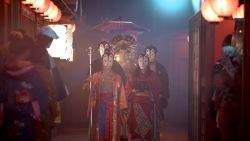
October 1, 2009
Tokyo Green Space
A bevy of local residents and organizations offer surprising visions for creating an urban forest
By Metropolis
Originally published on metropolis.co.jp on October 2009

Landscape architect Michio Tase
photo by Keigo Moriyama
Viewed from its tallest towers, Tokyo is an endless expanse of concrete that stretches for hundreds of kilometers. With the exception of a few wonderful large parks—many of them gifts from the imperial family—the city has never benefited from strong central planning or a top-down promotion of green space. The result is a gray urban environment largely cut off from nature.
Yet despite this overabundance of concrete and steel, Tokyo is home to an extraordinary mix of plant visionaries, educators, local governments and ordinary citizens engaged in an effort to make a greener metropolis. They are creating innovative spaces for gardens and wildlife, fostering new connections between residents and the natural world. The best part is, all of us have the opportunity to see some of these exciting developments and to participate in urban greening. Here’s a rundown of some of the most notable projects.
Sinajina: New Wave Bonsai

Photo by Kohji Shiiki

Kenji Kobayashi
photo by Kohji Shiiki
Bonsai shop Sinajina in Jiyugaoka presents exquisite miniaturizations of natural landscapes. Yet this is bonsai with a difference. Owner Kenji Kobayashi is widely acclaimed for modernizing the craft and fostering an appreciation of nature to an urban clientele. Unlike traditional masters, who are only interested in trees that are already hundreds of years old, Kobayashi uses young plants and experiments with a much wider variety of pots and styles. He is proud that his contemporary approach has introduced small-scale plants to a younger audience.
Sinajina also hosts classes where customers can create and maintain their own exquisite miniature landscapes. Actively caring for plants, Kobayashi insists, is the best way to connect to nature, as city dwellers can learn about life cycles, witness seasonal change and growth, and actively beautify them. In a culture where flowers and plants are considered disposable, Kobayashi wants young people to treat plants as members of the family, like a pet, who require care and attention over time. “It’s not enough for city people to visit the countryside for a day,” he says.
2-35-13 Okusawa, Jiyugaoka, Setagaya-ku. Tel: 03-3725-0303. Open Thu-Tue 10am-7pm, closed Wed. Nearest stn: Jiyugaoka. www.sinajina.com







